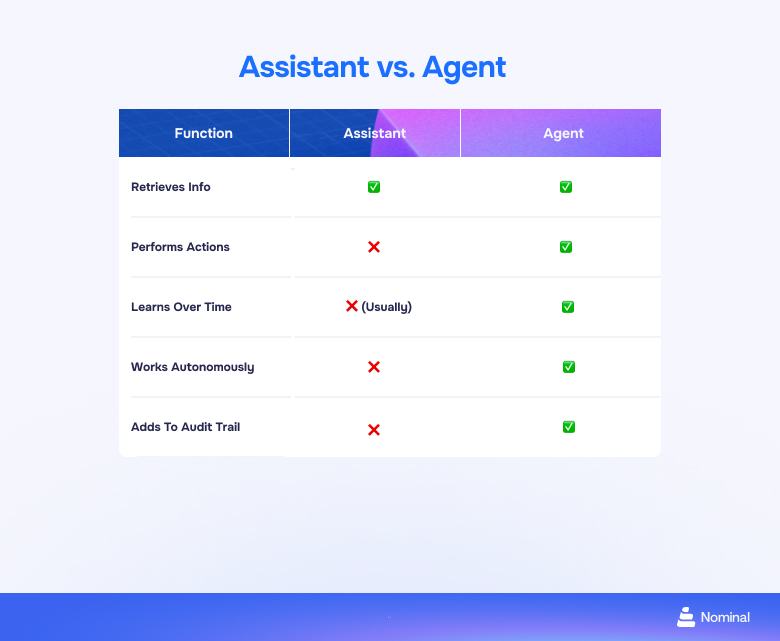
AI agents are digital team members that automate complex workflows in accounting and finance. Unlike static rules-based systems, they learn, adapt, and act, handling tasks like reconciliations, consolidations, and variance analysis with minimal human input.
The last few years have seen finance teams face a perfect storm of growing complexity, workforce shortages, and relentless pressure to move faster.
From multi-entity operations to real-time audits, the demands are high, and the spreadsheets just keep growing. It's clear that traditional tools can’t scale with the business anymore.
Meanwhile, artificial intelligence has moved from the labs into the hands of controllers, CFOs, and FP&A leads. But not all AI is built the same. While many are familiar with assistants that answer questions or generate summaries, a new wave of purpose-built systems is emerging.
These are AI agents, digital team members that don't just assist. They act.
Backed by real use cases, rigorous controls, and rapid ROI, this new model is changing how finance work gets done. It’s not about replacing accountants. It’s about freeing them from manual routines so they can lead with insight, not spreadsheets.
So what exactly are AI agents, how do they work, and why are they becoming essential to the modern finance stack? Let’s dive in.
What Are AI Agents?
AI agents are quickly becoming a foundational tool in modern finance, but the concept is still unfamiliar to many.
To understand what makes them different, we need to start with the basics and define how they’ve evolved alongside other automation technologies.
AI Agents vs. Traditional Automation
Traditional automation relies on static rules and rigid sequences. It handles repetitive actions well but lacks the flexibility to adapt to exceptions or nuance.
In contrast, AI-powered agents can understand context, follow logic, and execute step-by-step actions that mimic how a finance team member would work through a task.
The Rise of Agentic AI in Finance
Following the evolution from spreadsheets to RPA and then to intelligent assistants, finance is now entering the agentic era.
These systems go beyond answering queries. They act. They reconcile entries, route approvals, post to the general ledger, and explain variances. This shift is not futuristic: it’s operational today.
Agents, Not Assistants: What Makes Them Different?

AI assistants retrieve information. AI agents do the work. The distinction lies in autonomy and action.
Assistants help you search, while agents know when and how to act. They receive a trigger, interpret the objective, follow a set of instructions, and generate a result. This makes them fundamentally more valuable for operational finance.
Recommended read: AI Agents in Finance and Accounting: From Manual Tasks to Strategic Insights
How AI Agents Work
To appreciate what sets AI agents apart, it helps to understand how they operate under the hood. From triggers to outcomes, each element of their workflow is designed to mimic human logic while enabling automation at scale.
Triggers, Steps, Actions: The Technical Flow
Each agent workflow begins with a trigger. This might be a new journal entry, an uploaded spreadsheet, or a scheduled task. The system interprets the event and follows a predefined chain of instructions to complete the task.
In Nominal, this step-by-step logic mirrors how a human accountant would approach the same process.
Critique Mechanism: Improving Accuracy in Financial Data
To reduce risks like hallucinations, Nominal agents use a built-in critique process. This allows the system to double-check its logic mid-task.
If something doesn’t add up, the agent flags it, retries, or recommends human review. This review loop is essential for compliance and audit-readiness.
Human + AI: The Reviewer Model in Action
Rather than eliminating finance roles, intelligent agents shift the function. Humans move from doers to reviewers. Agents handle the digital legwork. Professionals validate outcomes.
This model keeps financial oversight intact while boosting productivity and reducing repetitive workload.
Applications of AI Agents in Accounting and Finance
The power of AI agents becomes clear when you see what they can actually do. Below are some of the most valuable use cases finance teams are already automating with agentic tools.
Reconciliation Agents
These agents ingest structured data, match transactions, and flag discrepancies. They eliminate the need to manually compare spreadsheets or chase down missing entries across systems.
Close Management Agents
Used during the month-end process, they coordinate workflows, assign ownership, and automate entries. Their audit trails ensure transparency and traceability throughout the close.
Multi-Entity Consolidation Agents
Perfect for complex organizations, these agents automatically eliminate intercompany transactions and standardize data across entities. They handle GL entries and understand nuances like currency conversions or local tax rules.
Variance Analysis Agents
They track fluctuations in financial data, generate narratives, and surface insights. Instead of spending days compiling reports, teams get contextual analysis in seconds.
Structured and Unstructured Data Processing
From parsing PDFs and invoices to normalizing messy Excel sheets, agents can process inputs with minimal formatting. This reduces manual data prep and frees up time for high-value analysis.
Why This Matters for Finance Leaders
This shift toward agent-powered finance is more than a technical upgrade. It addresses some of the biggest challenges facing finance leaders today and positions the team to drive greater value across the business.
Addressing Talent Gaps and CPA Shortages
With CPA retirement rates climbing and exam participation dropping, the finance talent pipeline is shrinking.
AI agents help teams stay lean without compromising output. They reduce dependency on scarce roles by absorbing routine workload.
From System of Record to System of Intelligence
Finance platforms are evolving. The best tools no longer just store data. They interpret it. With embedded intelligence, these systems offer insights, suggest next steps, and adapt to changing workflows.
Making Strategic Work the Default
When AI handles repetitive tasks, finance professionals regain time for analysis, scenario planning, and collaboration. This realignment supports better business decisions and elevates the finance function across the organization.
Getting Started: Where to Apply AI Agents First
Knowing where to begin is key. Not every workflow is a perfect fit for automation on day one, but there are clear signals that indicate readiness for AI-driven execution.
Look for Spreadsheet-Heavy Processes
Start by scanning for processes dependent on multi-tab Excel files. These are often reconciliation tasks, consolidations, or forecasting workbooks with multiple stakeholders.
Prioritize High-Volume, Repeatable Tasks
Target workflows with consistent rules but high transaction volumes. Recurring journal entries, GL updates, or cash applications are ideal candidates.
Use Case: Replacing Multi-Tab Excel with an Agent
Consider a consolidation workbook with 40 tabs across five entities. An agent can ingest the same inputs, validate data, perform eliminations, and output a final P&L. All in a fraction of the time.
What to Look for in an AI Agent Platform
With more vendors entering the market, it’s important to evaluate agent platforms critically. Security, reliability, and fit with your existing systems all play a major role in long-term success.
SOC 2 Compliance, Data Privacy & DPA
When dealing with financial data, security is non-negotiable. Choose platforms with strong governance credentials, including SOC 2 certification and clear data processing agreements.
Task-Level Accuracy and Audit Trails
Ensure agents produce traceable results. Every recommendation or entry should be backed by logs, approvals, and metadata to support internal and external audits.
Integration with Existing Finance Stack
Agents should plug into your ERP, data lake, and task management tools with minimal lift. Systems like Nominal are built to embed directly into your daily workflows.
The Future of Finance Is Agent-Enabled
Looking ahead, it’s clear that AI agents will be more than just a tool. They will shape how finance teams operate, grow, and collaborate across the business. Here’s what’s coming next.
New Skills: Configuring and Reviewing Agents
As Excel became table stakes in the 90s, agent literacy will be essential moving forward. Understanding how to prompt, fine-tune, and review outputs will become a core skill in accounting.
Pricing Shift: From Licenses to Task-Based Models
We’re moving toward consumption-based pricing. You won’t just license software. You’ll pay for the volume and accuracy of completed tasks, changing how ROI is measured.
Agents Won’t Replace Jobs. They’ll Reshape Them
Automation is eliminating manual tasks, not roles. Controllers and finance leads are evolving into architects of digital workflows. The work still needs human oversight, judgment, and strategy.
This is not about replacing expertise. It’s about unlocking it. The teams that adopt and adapt early will lead the way into a smarter, more strategic era of finance.
Want to see how AI agents can streamline your finance operations? Book a demo and explore how Nominal integrates with your current tools to drive real results.
Want to learn how AI can transform your finance operations? Join our free Smarter Finance with AI Masterclass and get practical insights to reduce manual work and unlock new efficiencies, all without overhauling your ERP.





